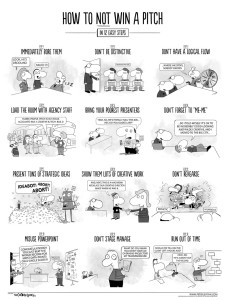How To Build A Smarter Advertising Agency Business Development Program – Part Two
 This Is part two of an interview about becoming a smarter advertising agency… Part One is right here.
This Is part two of an interview about becoming a smarter advertising agency… Part One is right here.
WARNING: This is a long blog post about how to build a better, smarter advertising agency. Actually, this is Part One of an even longer post. It is a looong post for a couple of reasons.
- This is a transcript of a 40-minute interview on advertising agency business development that I did with the super savvy Drew McLellen and his must / should listen to advertising podcast, “Build A Better Agency“.
- Google loves loong blog posts. So, having an interview transcribed into text is a very good SEO tactic. I’ve done this before with some of the interviews I did for my book on pitching. Having text allows me (us) to have an audio and text for a blog post which can then be marketed across social media sites like LinkedIn, Facebook, and Twitter. It is a very smart idea to extend the reach of any thought leadership you do. So easy too.
- Some people would rather read an interview than listen to it so here it is.
- I want to use Drew as an example of how to do and market a podcast. To date, he has done 49 interview podcasts. Podcasting provides 4 basic but sweet benefits. 1) It is a great way to look and sound like an expert by interviewing other experts; 2) podcasts are relatively easy to do; 3) interviewing people helps you make friends (imagine having an agency podcast in your agency’s specialized category where you interview potential clients); 4) it is all about marketing yourself or your company.
The Full Service Agency Issue
Drew: What about the idea of every agency that presents itself refers to itself as a full-service agency regardless of if they have 3 employees or 300 employees. What’s your take on that?
Peter: Most agencies were full service once upon a time. Then we started to see a move into direct marketing, which has been happening for years as we seek ‘proof’, but I’d say about 10 or 15 years ago, direct marketing started to look really attractive as digital marketing started to happen because analytics … all of a sudden we could really track everything.
There was a move into that. In fact, at one point I renamed Ralston Group, the agency I bought, Ralston360. The 360 moniker, which I think became way overused, was really about understanding the full spectrum of marketing. The problem, unfortunately, with full service, while most clients need it, it just doesn’t provide enough of a niche basis for them to be able to position you differently than the other agencies.
That said, the reality today is that most of the digital agencies I know are being asked to do a full-service work, but they’re at least, at the start, able to position themselves in a niche.
I like full-service. The problem unfortunately is, while the clients probably want that, what they don’t get out of that is any differentiation between you and the next guy. I don’t like those words, full service.
Drew: We go into the field and do some research with CMO’s and sort of different attitudes they have about agencies and how they work with agencies and everything every year. Last year, we sort of explored the idea of the words full service. What we heard from the folks who participated in the research was they don’t believe it. When they look at an agency of 20 people and they know how complicated marketing has gotten, especially on the digital side, they sort of say, “I don’t think so.”
Peter: Yeah, I mean to an intelligent marketer, I agree completely. Really, nobody’s figured out mobile marketing yet. How could you conceivably say that you understand the full spectrum because there are elements that are changing so fast that there are very few agencies that actually can lay claim. Now that said, I’ve seen agencies that just say we’re a mobile agency and they’re doing very very well.
Drew: Right.
Peter: There are a lot of factors here. It’s just really understanding where your internal skillset fits into the spectrum.
Get This Right: Positioning & Fame
Drew: When you work with agencies, I believe where you start is sort of, “Hey, what do you want to get our of this? What are your objectives,” and then, “How do we position you to help you achieve those objectives?” Yes?
Peter: It’s very much about positioning, but I’ll even take it to the next step. It’s not enough to have a good positioning. It’s how you express it. I’ve been moving to a world concept and it’s very much back from my Saatchi and Saatchi days. I ask agencies if they want to be famous. What does that mean? Do you want to be well-known and then what do you want to be well-known for? I suggest that yes, let’s get to a positioning that makes sense, that’s based on a business plan, which means if you get those kinds of clients, you’ll be making a very good living. But do something that gets noticed.
Part of having a positioning, the most important part I think is to make sure that you get the word out. How do you express it in your inbound and outbound marketing is probably the most critical element. Yes, you need an business objective, then a positioning, but then how do you get the word out?
I think, unfortunately, that many many agencies fail at sales. How do we enunciate the positioning? How do we get those words into people’s heads? To resonate?
Drew: I know one of the things you do a lot of work with agencies around is the whole idea of how to pitch different and better. What are two or three mistakes that most agencies make in their pitching activity?
12 Huge Mistakes
 Peter: You know, it’s funny. I knew this was coming, I have to admit it so I put up a poster I made from the 12 cartoons on my website, which are the 12 mistakes that agencies make when pitching and presenting. I’m not going to say all but 12 mistakes, but it’s a pretty funny cartoon.
Peter: You know, it’s funny. I knew this was coming, I have to admit it so I put up a poster I made from the 12 cartoons on my website, which are the 12 mistakes that agencies make when pitching and presenting. I’m not going to say all but 12 mistakes, but it’s a pretty funny cartoon.
Couple of examples. One is, load the room with agency staff. It’s is often so disproportionate. We’re going to have six agency people and three clients. The numbers game doesn’t work in dating and it doesn’t work in a pitch. Another certainly is agencies actually are afraid of being distinctive. “Oh my God, I’m too different.” The bottom line is clients need that.
Another is that agencies don’t really think very hard about how to build chemistry with the clients and I’ll say based on the range of agency consultants that have provided input into my book, in many cases it comes down to two things. One, agencies are not listening. They’re talking about themselves, which also creates the problem of agencies are not building chemistry. Most accounts are won on a chemistry basis. Yes, sometimes if it doesn’t work, there’s not much you can do about it, but I suggest agencies that they really have to manage the chemistry process, which by the way, starts with the first time the guy goes and looks at your website.
Drew: What are some ways that an agency can focus on and improve the odds on the chemistry side? What are some things they can do to try and up their game in that arena?
Peter: I think it’s critical that you understand the personas of the people that are going to be in the room with you. I use, an interesting angle, which I found by accident one day. We all go to LinkedIn and we read the profile, we read the recommendations of other people. You go to my profile on LinkedIn and you can read what other people said about me. What I realized one day was I would learn more about someone if I read what they wrote about someone else.
Drew: Ah, interesting.
Peter: Right? Because, and I have a really good example in the book of a CMO who, when he recommended his ex-employee, talked about the things that he appreciated about those people. Now it’s his voice telling me what he values and I’m not a genius, but somehow I stumbled into that and I thought, “Wow, that’s a very interesting way of understanding the person I’m pitching to.” Because now I’m hearing him talk about what he likes.
Drew: Right. In his own words, he’s describing what he values.
Peter: In his own words, absolutely.
More Pitch Chemistry
Drew: That’s great. Another thought about chemistry?
Peter: It’s a people problem. First of all, let me say that agencies … in any smart business meeting, you should do some rehearsal. In a pitch, you should do a lot of rehearsal, but here’s the potential problem.
Drew: Wait a second. So you mean, rehearsing in the car on the way to the pitch is not enough?
Peter: I’m willing to say that I’ve probably done that myself. I will say in the days that I worked at Saatchi in London where we thought we were really hot shit, we didn’t rehearse very well. In fact, in the book is a story I called, “The Worst Pitch Ever,” where we did no rehearsal and lost the opportunity to win the Adidas global business. I’ve got a good story about a high-powered team that failed because they did not rehearse – and, we showed a gruesome film about baby seals being beaten.
Here’s the downside of rehearsing and it happens in agencies where not everybody is super glib and the great presenter. Some people get so locked into what they rehearsed that they can’t break out. They’re not listening to the client in the meeting and they can’t ad lib.
I’ve seen that happen unfortunately. On one sense, you need to rehearse and the other is you need some ability. If the client says something that’s not in the script, you need to be able to get off script.
Drew: Yeah in a hurry.
Peter: In a hurry and this is not easy stuff. I think we’ve all had our … I’ll just pick on one person. The creative director who completely goes off track and talks for 20 minutes about some TV shoot he did in Brazil.
Drew: Right. Or the person who’s rehearsed so badly that they forget their line, in essence, and freeze.
Peter: Yeah. Big time.
Inbound marketing and New Business
Drew: When you think about agency new business, how has it changed over the years? What’s different today, then say back when you were with Saatchi or early in your career? What do the agencies need to be thinking about today? Because a lot of agency owners have been doing this for a long time and I suspect whatever new business activity they have, whether it’s they belong to their local chamber or they sit on a trade show committee for the industry that they service. They’re doing it the way they’ve done it for the last 20 or 25 years, so what’s different?
Peter: Without question, the biggest difference is inbound marketing. It used to be all about reputation. Gee, you work at humongous Saatchi and Saatchi, we’re going to give you a phone call. Or it was outreach, where I knew the people I wanted to work with.
The biggest difference today is the world of inbound marketing, whether it’s search engine optimization or understanding how to use customized content, research, then LinkedIn and Twitter and other tools. Thought leadership and inbound marketing are imperative and I think it’s an opportunity, a missed opportunity for too many agencies. They just don’t understand it. They don’t know how to create lots of content, they don’t know how to create the right content and when I say right content, I mean agency blogs that talk about things that other agencies talk about. They’re not talking about things that are of great relevance to the kind of client that they want to attract. I think there’s a failure there. Agencies better understand inbound marketing for their clients, they’re not using it intelligently for themselves.
Drew: Do you think that’s because, again, back to our cobbler’s children example. Do you think that’s because they don’t invest enough time in it or that they don’t give it enough thought? Or that they’re not willing to narrow the focus and discourage somebody with a buck in their pocket from calling?
The Not Enough Time Issue
 Peter: I think the biggest issue is time scarcity and dedication. I’m a good inbound marketer. I’m good at search engine optimization, I’m a writer. Now those, to a certain extent, are my personal traits and not every agency owner is going to have those personal traits, but I think that they have to think like a manager and figure out how to be able to attract and it’s an attraction strategy. How are we going to attract the kind of clients that we want?
Peter: I think the biggest issue is time scarcity and dedication. I’m a good inbound marketer. I’m good at search engine optimization, I’m a writer. Now those, to a certain extent, are my personal traits and not every agency owner is going to have those personal traits, but I think that they have to think like a manager and figure out how to be able to attract and it’s an attraction strategy. How are we going to attract the kind of clients that we want?
However, I don’t think you can just live on attraction strategy alone.
There’s this lovely concept of winning without pitching. The bottom line is you’re going to have to pitch and you’re going to have to do outbound marketing. As ways to tie all of that together, there’s no reason that inbound marketing and outbound marketing can’t link up. I talked about my agency’s healthcare social media research analysis. Well that was both inbound, i.e. people found it. But, it was also outbound. We sent it out to our top prospects.
I think another key difference today is, and this is unfortunate, is that many prospects will go to your website, figure you out and choose never to call you up and that’s the big difference today versus pick a number, 15, 20 years ago. A lot of decisions are made outside of your control.
You don’t even know they showed up.
Drew: You don’t know that you’re on their radar screen.
Peter: Exactly.
More On Thought Leadership
Drew: One of the things we were chatting about before we started the podcast was this idea of thought leadership. Where do you stand on all of that for agencies and how could agencies do it better than they’re doing it now?
Peter: I think it’s critical and it’s a very broad subject. Let me just pick one aspect, which I think a lot of agencies haven’t figured out, unfortunately. That is, and I’ll use just two words, Guest Posting. Guest Posting to get broad and targeted reach.
There is such a need for content across all types of websites and I mean advertising websites, marketing websites, Huffington Post, Forbes. There’s such a need for content. These sites are so voracious, that there’s absolutely no reason that an agency leader cannot write for Forbes. If you look at the people who are writing on Forbes.com, there are agency owners, there are consultants. Lots of people.
Business to Community is another big site. The list goes on forever, so I think one of the things that people don’t realize is, while your website is somewhat limited in terms of the amount of attraction it has, there’s absolutely no reason you can’t be writing for broader websites.
Drew: Absolutely. That’s a strategy that I have employed for years and it serves me well. It’s sticky, it serves you well for years and years and years.
Peter: If no one in your agency is a great writer, then someone in your town is. Unfortunately, a lot of very good journalists are out of work.
Seth Godin and Reading and Pain Points
 Drew: One of my goals with the podcast is to make sure that we give agency owners who are listening some next steps. Some action items that they can take to advance the topic. If someone’s been listening to us and we’ve touched on a lot of things. We touched on positioning and pitching and thought leadership and niching yourself, all of those things. If an agency owner wants to take two or three steps on their own to begin to get better at any or all of that, what would you recommend that they do in the next 24 hours, 48 hours to begin to improve the way they think about and create activity around the idea of new business?
Drew: One of my goals with the podcast is to make sure that we give agency owners who are listening some next steps. Some action items that they can take to advance the topic. If someone’s been listening to us and we’ve touched on a lot of things. We touched on positioning and pitching and thought leadership and niching yourself, all of those things. If an agency owner wants to take two or three steps on their own to begin to get better at any or all of that, what would you recommend that they do in the next 24 hours, 48 hours to begin to improve the way they think about and create activity around the idea of new business?
Peter: This is going to sound a little pat, but a suggestion to become a smarter advertising agency is to go back to the basics and read two or three Seth Goden books. I mean, that maybe sounds simplistic, but – at least speed read his books.
Drew: No, he’s brilliant.
Peter: There are a few sales and marketing writers out there who I think nail it and I really suggest that just really getting inside Seth’s head … We’re very lucky in Portland. We have Powell’s Bookstore, which is an enormous store. I just go for an hour and sort of speed read business books. That’s something I’ll suggest.
Another is to really understand this concept of pain point. Again, sales people really understand it. What is the pain point that your prospective client has? Whether it’s his personal pain point, he’s got to save his job or he’s got to sell a new product or a new service or he’s up against some competition.
Really figuring out what this means, this concept of pain point, because pain points are what sales people use to sell.
Drew: Peter, if listeners want to find you, they want to track you down, they want to read some of your writing, obviously they can find your book on Amazon. What’s the best way for them to reach out to you?
Peter: I have something I call a Corleone offer, which is an offer, I assume, most people can’t refuse. Let’s just talk for fifteen or so minutes and I’ll certainly give you at least one good idea.
Drew: You’re right. How can I refuse that? Everybody, go check out Peter’s website. If you have not read his book, it’s a great read. I highly recommend it. Peter, I know you’re super busy working with agencies all over the globe so really appreciate you taking out the time to do this and to share your insights with everybody. Thank you.
Peter: Thank you and great luck with the podcast.
Drew: Thanks so much.
Part One Is Good Too…
I bet some of you got to part two without reading Part One. So, here is a handy link to Part One.

Leave a Reply